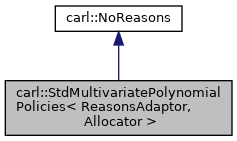carl::StdMultivariatePolynomialPolicies< ReasonsAdaptor, Allocator > Struct Template Reference
The default policy for polynomials. More...
#include <MultivariatePolynomialPolicy.h>
Inheritance diagram for carl::StdMultivariatePolynomialPolicies< ReasonsAdaptor, Allocator >:

Collaboration diagram for carl::StdMultivariatePolynomialPolicies< ReasonsAdaptor, Allocator >:

Public Member Functions | |
| void | setReason (unsigned index) |
| BitVector | getReasons () const |
| void | setReasons (const BitVector &) const |
Static Public Attributes | |
| static const bool | searchLinear = true |
| Linear searching means that we search linearly for a term instead of applying e.g. More... | |
| static const bool | has_reasons = ReasonsAdaptor::has_reasons |
Detailed Description
template<typename ReasonsAdaptor = NoReasons, typename Allocator = NoAllocator>
struct carl::StdMultivariatePolynomialPolicies< ReasonsAdaptor, Allocator >
The default policy for polynomials.
Definition at line 20 of file MultivariatePolynomialPolicy.h.
Member Function Documentation
◆ getReasons()
|
inlineinherited |
Definition at line 17 of file ReasonsAdaptor.h.
◆ setReason()
|
inherited |
◆ setReasons()
|
inlineinherited |
Definition at line 18 of file ReasonsAdaptor.h.
Field Documentation
◆ has_reasons
template<typename ReasonsAdaptor = NoReasons, typename Allocator = NoAllocator>
|
static |
Definition at line 31 of file MultivariatePolynomialPolicy.h.
◆ searchLinear
template<typename ReasonsAdaptor = NoReasons, typename Allocator = NoAllocator>
|
static |
Linear searching means that we search linearly for a term instead of applying e.g.
binary search. Although the worst-case complexity is worse, for polynomials with a small nr of terms, this should be better.
Definition at line 28 of file MultivariatePolynomialPolicy.h.
The documentation for this struct was generated from the following file:
- carl-arith/poly/umvpoly/MultivariatePolynomialPolicy.h